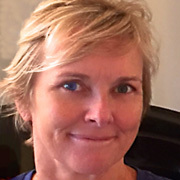
Beth Tredray
Working in a Wellington office job, future sound designer Beth Tredray would often gaze down from the sixth floor, watching people carrying big square cases along the road. One day curiosity proved too much, and a moment of boldness permanently changed her trajectory. She asked one of the box carriers what was inside. Her suspicions that they were filled with vinyl records were confirmed — the person was in fact a radio announcer, carrying the day’s playlist to Broadcasting House. They suggested she apply. She began her cadetship three months later.
It was with Radio New Zealand that Tredray learnt the ropes of sound recording, doing five am shifts on Morning Report. Often she dragged microphones in the rafters above Wellington Town Hall, preparing for the next live performance by the NZ Symphony Orchestra.
She applied to be a sound assistant at the Government's National Film Unit, where she would work on films like 1986’s sheepdog documentary Dogstar. She was also regularly contracted out to TVNZ as a sound recordist on One News, Close Up, Top Town and more. Her mentors at the NFU included veterans John Neill and Kit Rollings.
In the early 90s Tredray decided to go freelance. She worked on Grant Lahood’s offbeat short The Singing Trophy, and travelled widely as a sound recordist on a range of documentaries, from 1998's Cave Creek to series Epitaph, which explored curious deaths based on headstone epitaphs. She also did stints as a foley artist — the complex art of creating new sound effects to match existing footage — including on the award-winning Once Were Warriors.
In the 2000s, Tredray began venturing into sound design and sound mixing. Her earliest such credit was for Qantas award-winning motorcycle documentary Love, Speed and Loss (2005). Tredray would work again with Justin Pemberton — the director of the doco — on nuclear power chronicle The Nuclear Comeback, and 2012 telefeature The Golden Hour, which was nominated for an International Emmy. The Golden Hour recreates legendary Kiwi victories at the 1960 Rome Olympics; Tredray was in charge of the sound design, edit and mix.
Tredray's other sound design credits include 2014 series Nigel Latta, roving food show Hunger for the Wild, award-winning documentary The Art Star and the Sudanese Twins, and short film Great Western. Three-part show Decades in Colour (2016) required the creation of a whole new soundtrack, as the programme was built from archive footage.
In 2016 she was Sound Designer on David Farrier and Dylan Reeves’ hit documentary Tickled, which explores the world of competitive tickling.
Sources include
Beth Tredray
'Beth Tredray' LinkedIn website. Accessed 27 March 2017